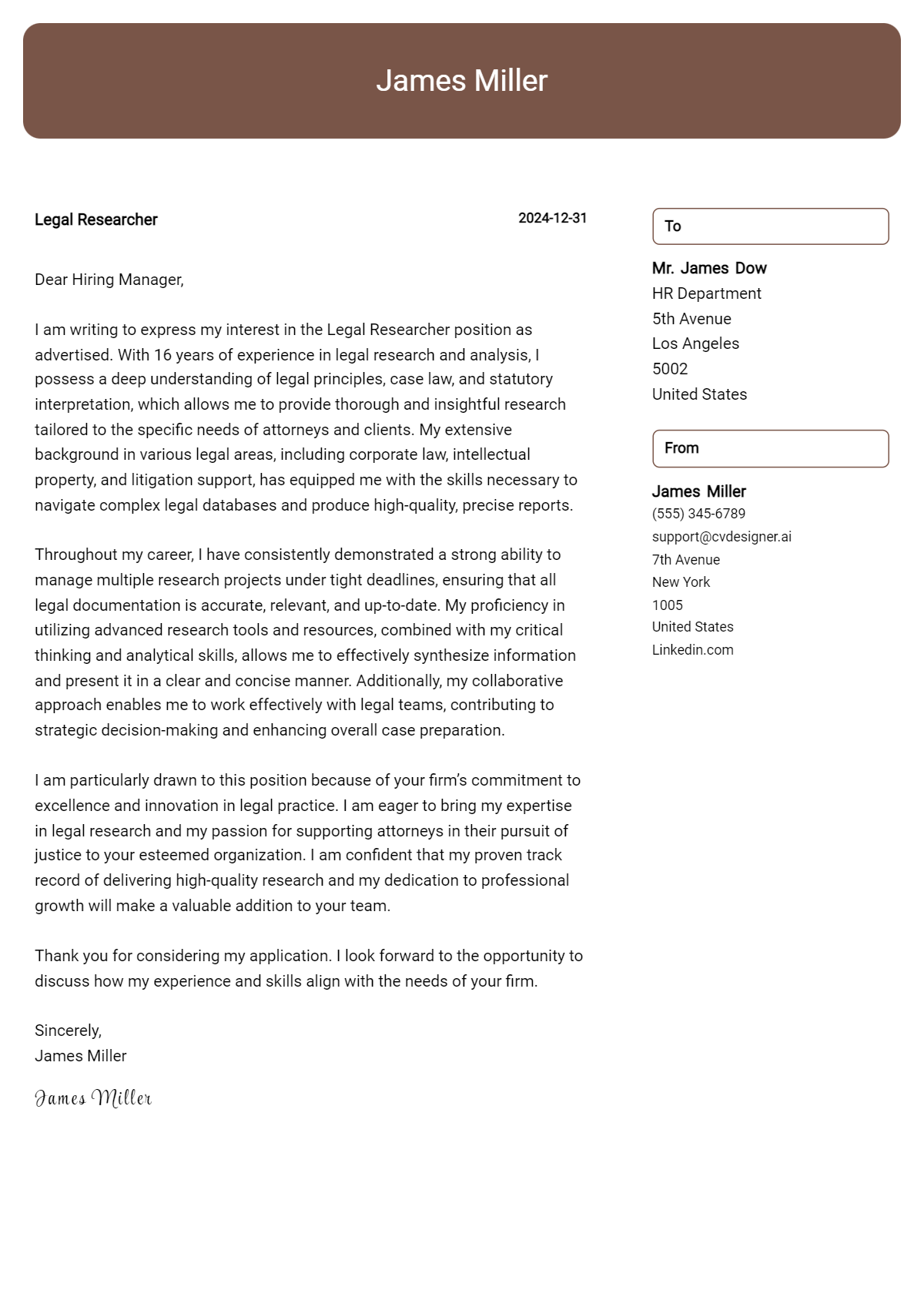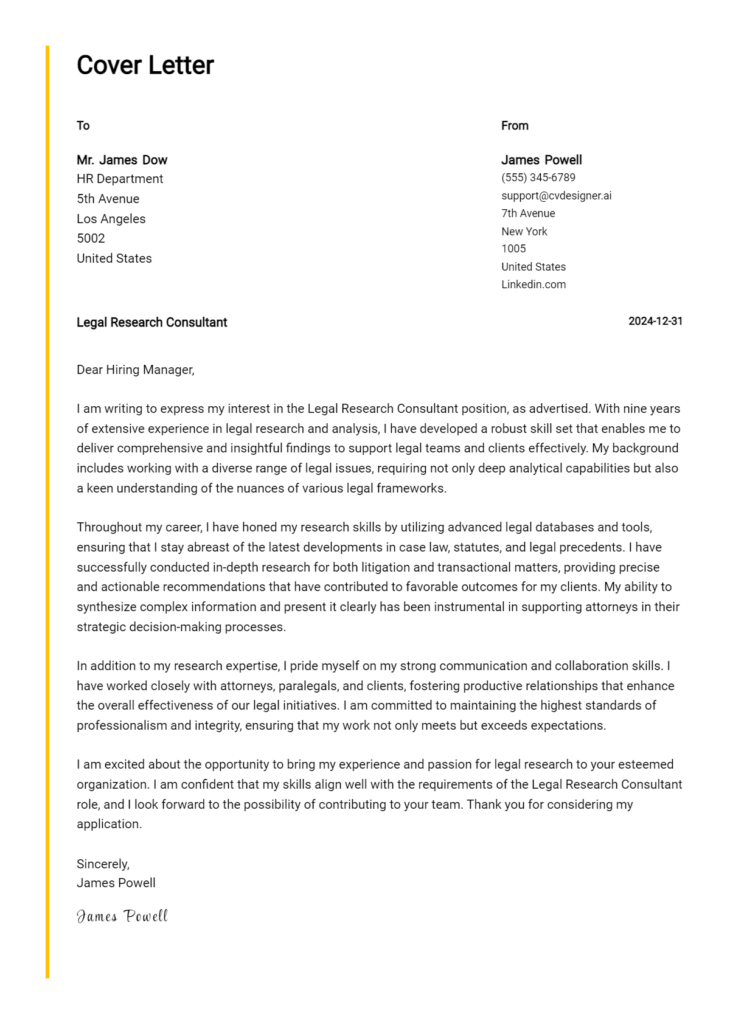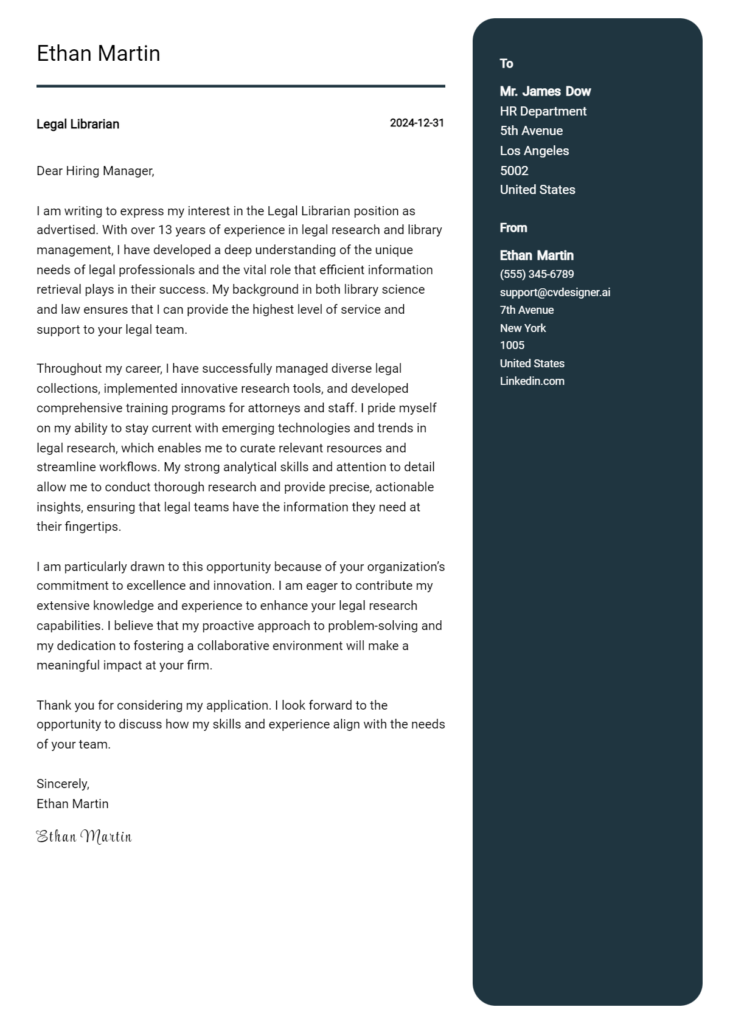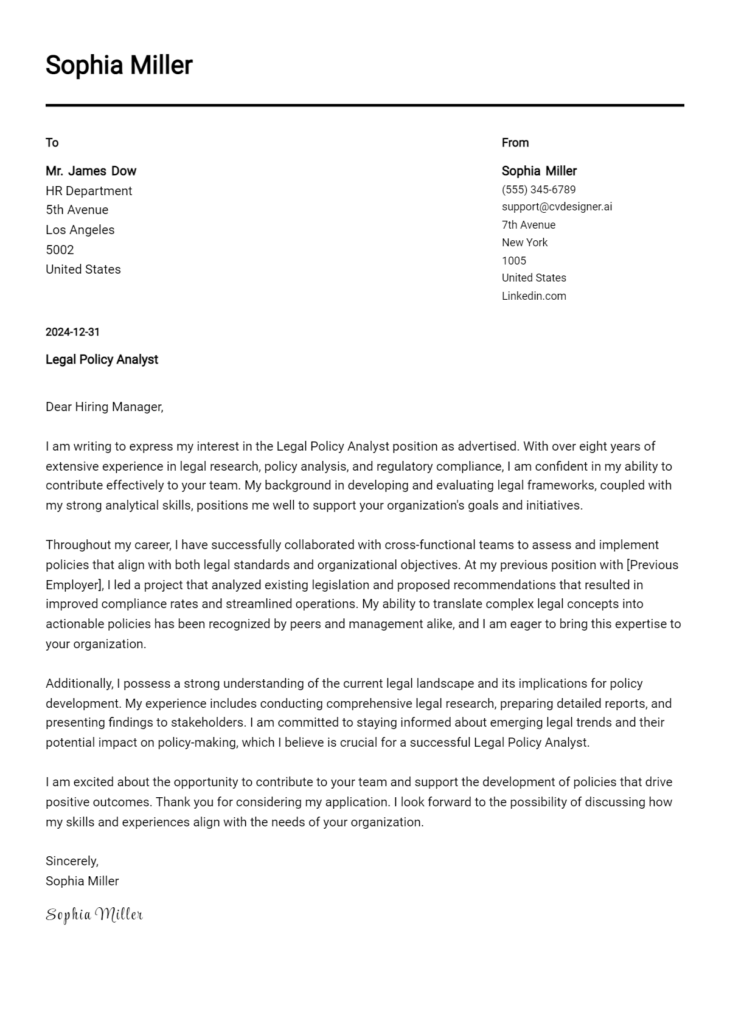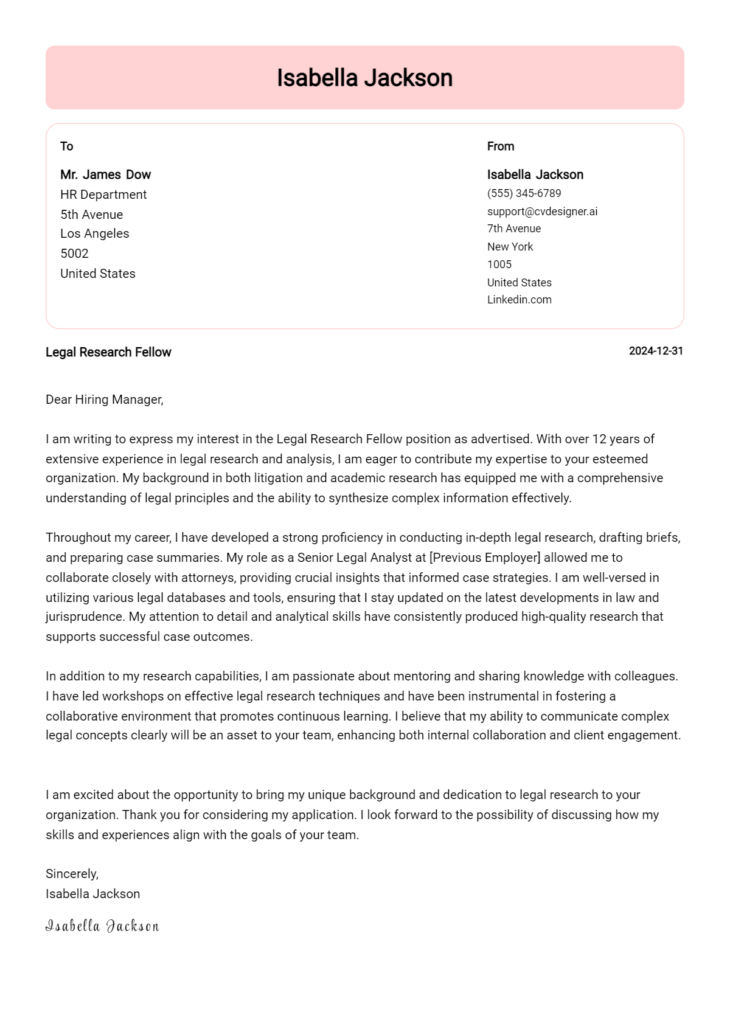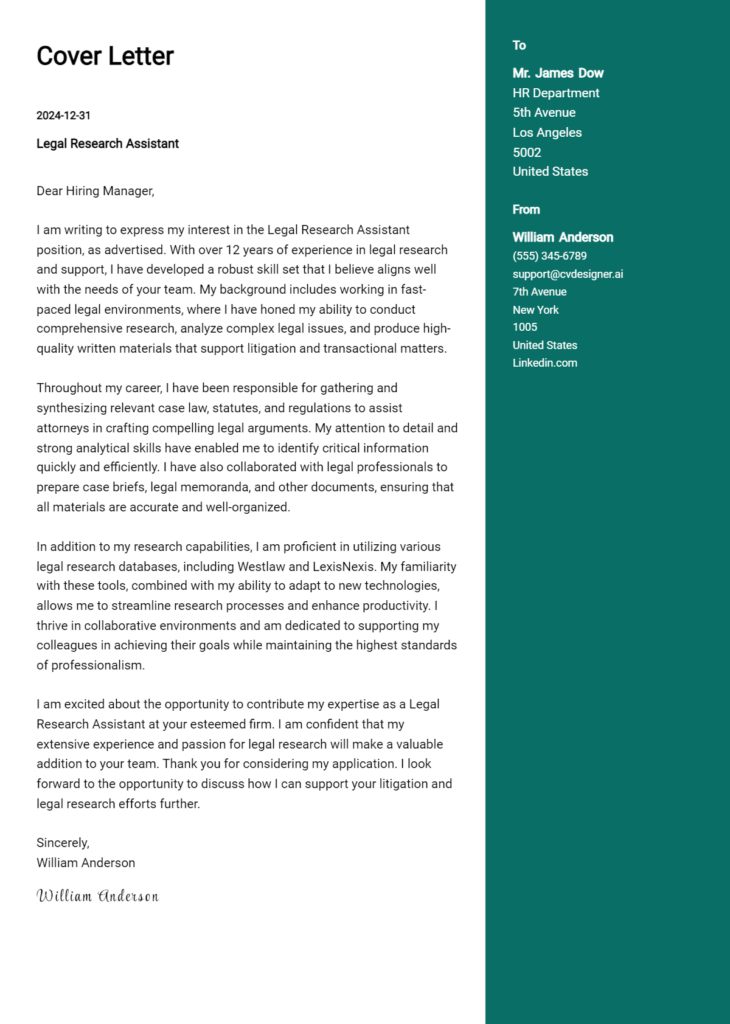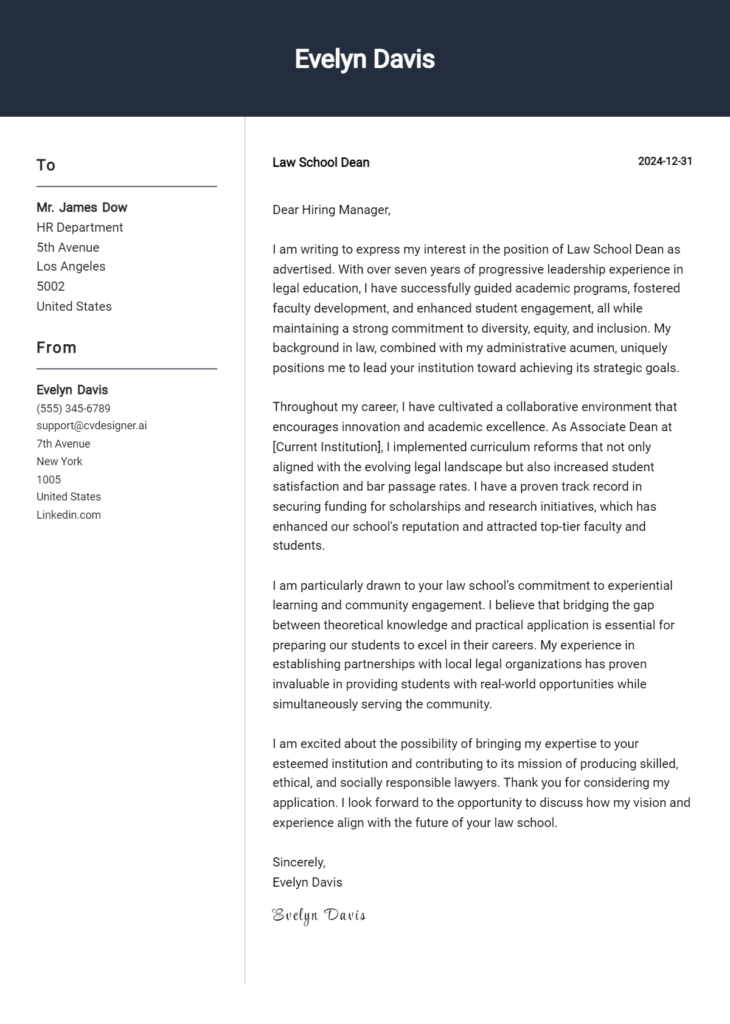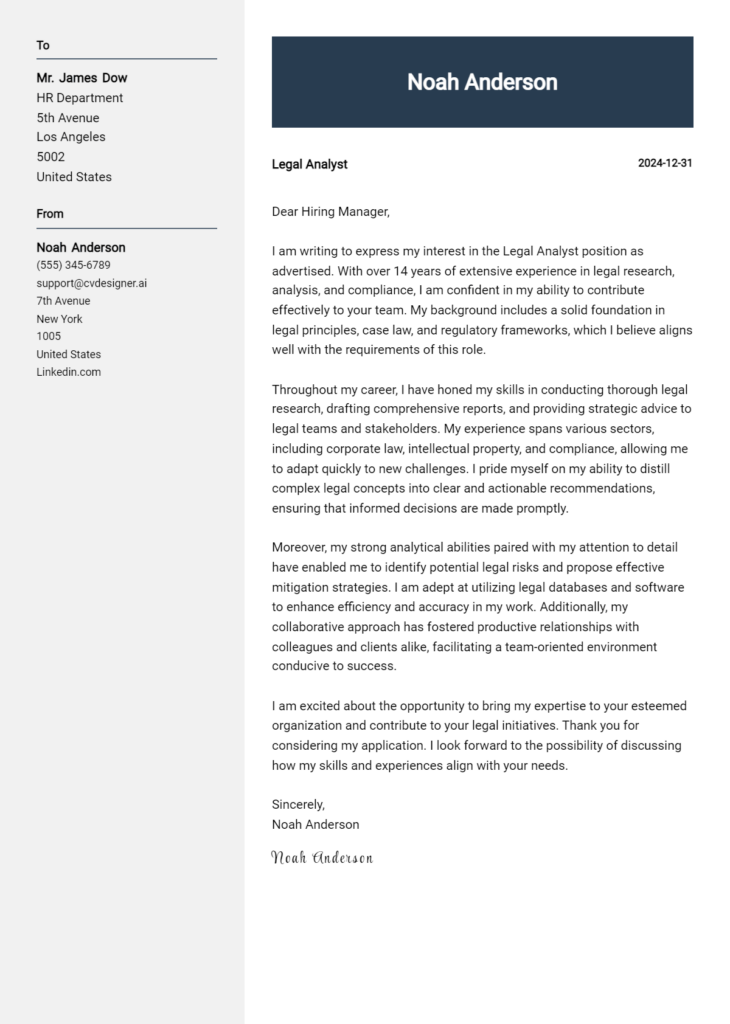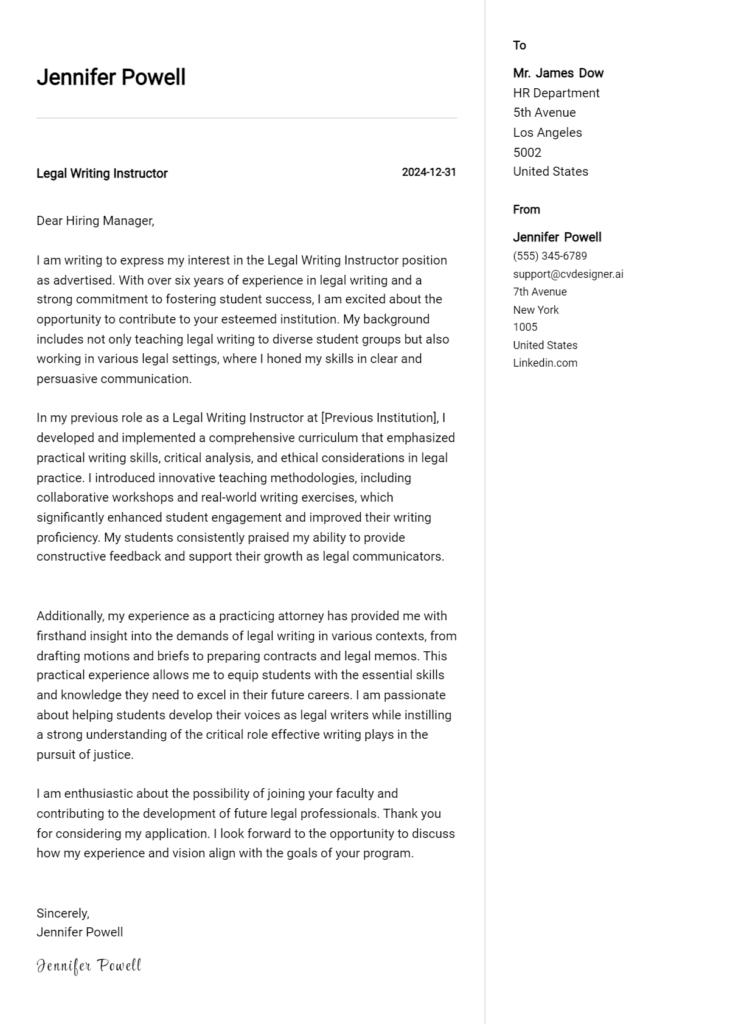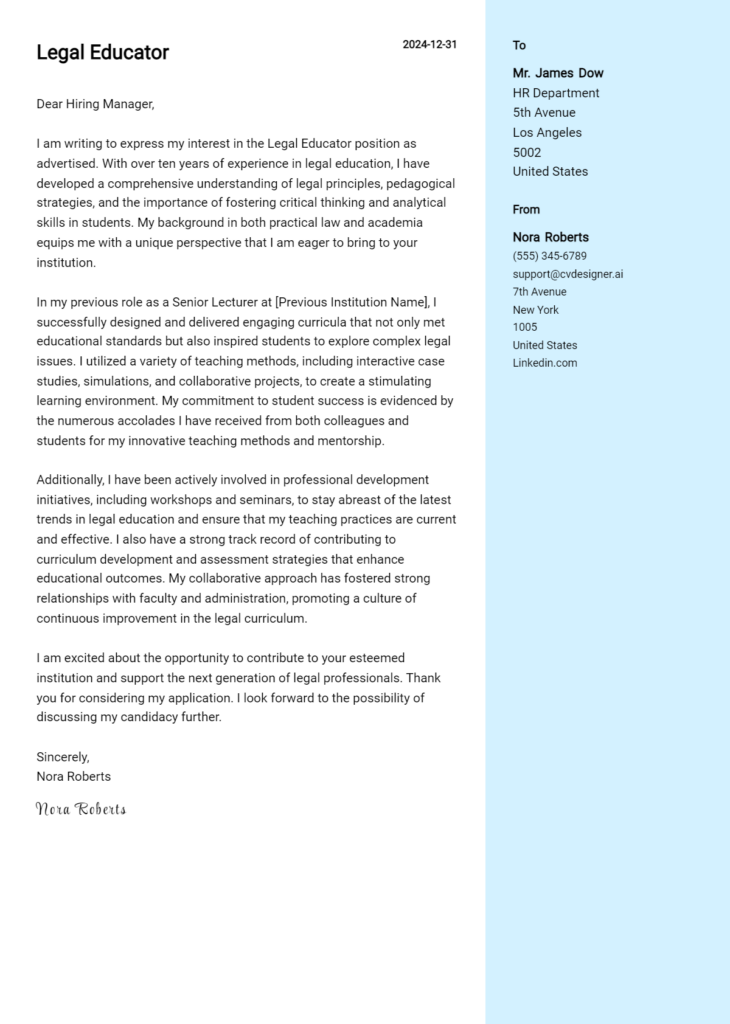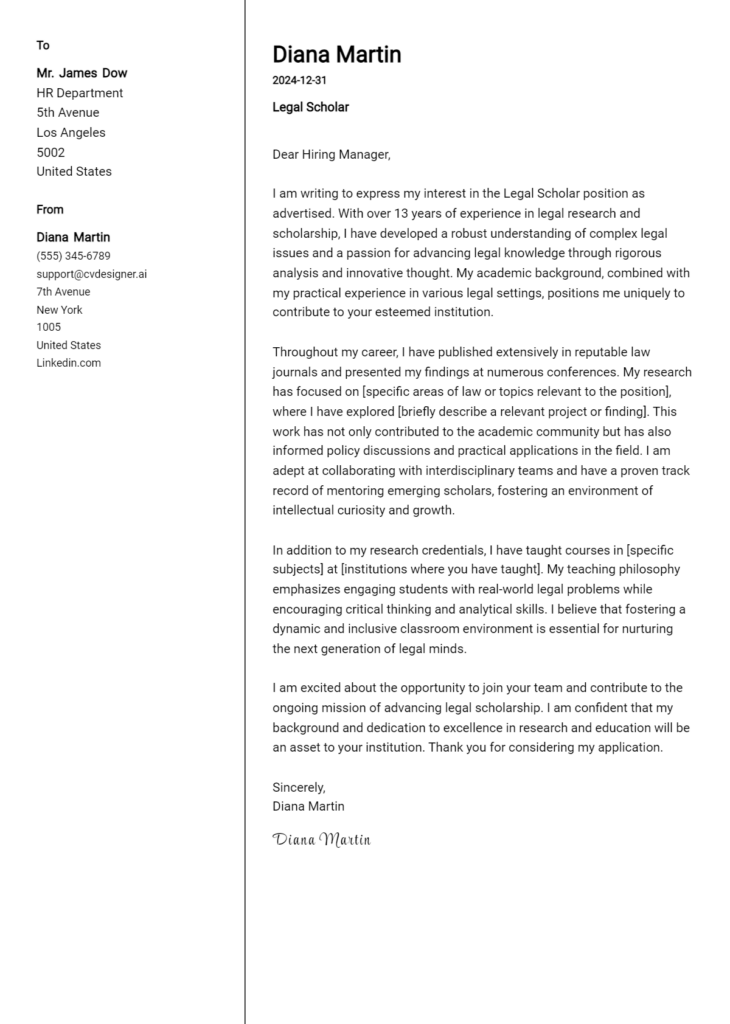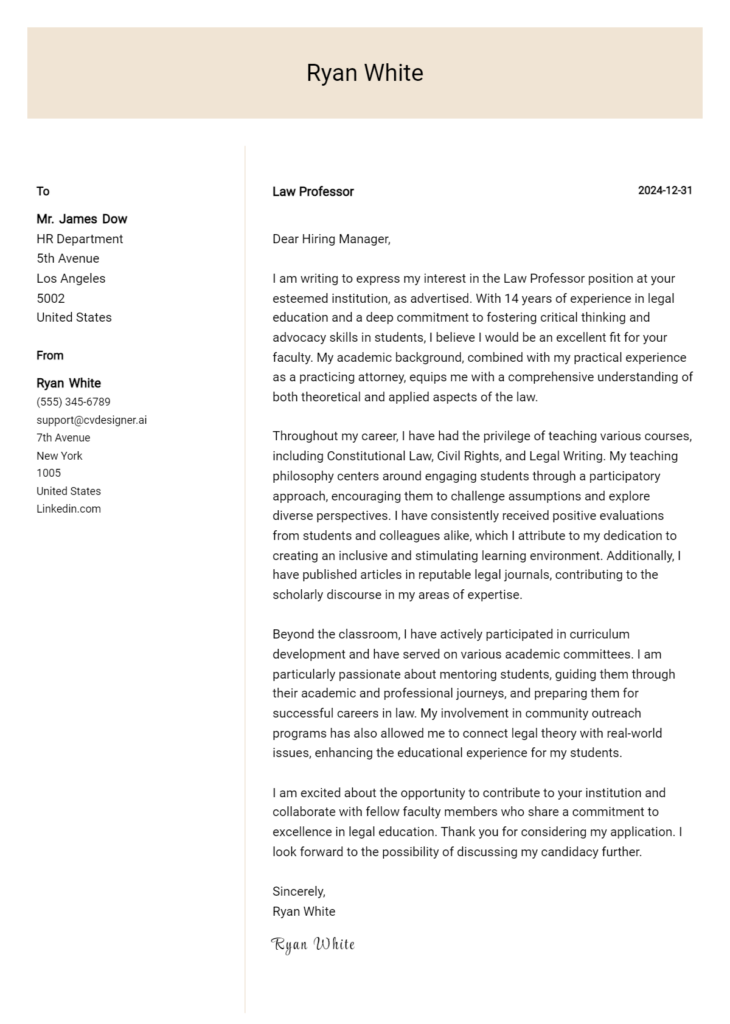Legal Researcher Cover Letter Examples
Explore additional Legal Researcher cover letter samples and guides and see what works for your level of experience or role.
How to Format a Legal Researcher Cover Letter?
Crafting a well-structured cover letter is essential for a Legal Researcher, as it serves as your first opportunity to demonstrate your analytical abilities and meticulous attention to detail. The way you format your cover letter not only showcases your qualifications but also reflects your understanding of the legal profession, where precision and clarity are paramount. A polished cover letter can capture the hiring manager's attention and set the tone for your application.
In this guide, we will outline how to effectively structure your cover letter, providing insights and legal research-specific examples to help you create a compelling document.
We will focus on the essential components of a professional cover letter, including:
- Cover Letter Header
- Cover Letter Greeting
- Cover Letter Introduction
- Cover Letter Body
- Cover Letter Closing
Each section is crucial in highlighting your qualifications and professionalism. Let’s delve into each part and explore how to make your Legal Researcher cover letter stand out.
Importance of the Cover Letter Header for a Legal Researcher
The cover letter header is a crucial component of any job application, especially for a Legal Researcher, as it sets the tone for the document and establishes the professionalism of the candidate. A well-structured header should include the applicant's contact information, the date of writing, and the recipient's details, such as the hiring manager's name, title, and organization. Clarity and professionalism in this section are vital, as they reflect the candidate's attention to detail and organizational skills—qualities that are essential for a successful Legal Researcher.
A strong header conveys confidence and competence, while a weak one may create an impression of carelessness. Below are examples of both a strong and a weak cover letter header for a Legal Researcher.
Strong Example
Jane Doe 123 Legal Lane Law City, ST 12345 (123) 456-7890 jane.doe@email.com October 15, 2023 Mr. John Smith Head of Legal Recruitment Law Firm ABC 456 Justice Avenue Law City, ST 12345
Weak Example
jane doe 123 legal lane, law city (123) 456-7890 10/15/23 John Law Firm
The Importance of a Strong Cover Letter Greeting for a Legal Researcher
The greeting of your cover letter serves as the initial point of contact between you and the hiring manager, setting the tone for the rest of your application. A well-crafted greeting demonstrates professionalism and a personal touch, showing that you are not only interested in the position but also respectful of the recipient's role in the hiring process. Addressing the hiring manager by name, if possible, can help create a connection and make your cover letter stand out amidst a sea of generic applications. To achieve this, take the time to research the recipient's name through the firm’s website or LinkedIn, as using a specific name rather than a vague title reflects diligence and attention to detail. On the other hand, using a generic greeting can portray a lack of effort and enthusiasm.
Strong Greeting Example:
Dear Ms. Johnson,
Weak Greeting Example:
To Whom It May Concern,
The Importance of a Captivating Cover Letter Introduction for a Legal Researcher
A well-crafted cover letter introduction is crucial for a Legal Researcher, as it serves as the first impression to the hiring manager. This opening paragraph should effectively capture the reader's attention, convey genuine enthusiasm for the role, and briefly highlight key skills or achievements relevant to the position. A strong introduction sets the tone for the rest of the cover letter, inviting the reader to learn more about the candidate's qualifications and fit for the role. Below are examples that illustrate the difference between a compelling introduction and a less impactful one.
Strong Example
Dear Hiring Manager, I am excited to apply for the Legal Researcher position at [Company Name], as I believe my robust analytical skills and five years of experience in legal research align perfectly with your team's needs. My recent project, which involved reviewing and synthesizing complex case law for a high-profile litigation case, not only honed my research abilities but also resulted in a favorable outcome for our client. I am passionate about leveraging my expertise to contribute to [Company Name]'s commitment to excellence in legal services.
Weak Example
To Whom It May Concern, I am writing to apply for the Legal Researcher position. I have some experience in legal research, and I think I might be a good fit for the role. I hope to discuss my qualifications further.
Importance of the Cover Letter Closing for a Legal Researcher
The closing paragraph of a cover letter is crucial for leaving a lasting impression on potential employers, especially for a Legal Researcher role. It serves as a final opportunity to summarize your qualifications, reiterate enthusiasm for the position, and encourage the hiring manager to take the next steps, such as reviewing your resume or scheduling an interview. A strong closing can effectively reinforce your fit for the role and convey your eagerness to contribute to the organization, while a weak closing may risk undermining the overall impact of your application.
Strong Example
Thank you for considering my application for the Legal Researcher position at [Company Name]. With my extensive experience in conducting thorough legal research and my commitment to delivering accurate and timely results, I am excited about the opportunity to contribute to your esteemed firm. I look forward to discussing how my skills align with your needs and how I can support your team. Please feel free to reach out to schedule an interview at your convenience. I have attached my resume for your review.
Weak Example
Thanks for looking at my letter. I hope you like my resume. I would like to work at your place, so call me if you want to talk.
Crafting an effective cover letter is essential for candidates seeking a position as a Legal Researcher. This document provides an opportunity to highlight your technical skills, problem-solving abilities, knowledge of the Software Development Life Cycle (SDLC), teamwork capabilities, and your passion for continuous learning. By demonstrating these qualities, you can distinguish yourself from other applicants and show potential employers that you are well-equipped for the role.
Cover Letter Writing Tips for Legal Researcher
Highlight Technical Skills: Begin your cover letter by emphasizing your technical skills relevant to legal research. Mention specific tools and software you are proficient in, such as Westlaw, LexisNexis, or various database management systems. Detailing your technical expertise showcases your ability to efficiently gather and analyze legal information, which is crucial in this role.
Showcase Problem-Solving Abilities: Use examples from your previous experiences to illustrate your problem-solving skills. Describe situations where you encountered complex legal issues and how you approached them. This not only demonstrates your analytical thinking but also shows your ability to navigate challenges effectively, a key trait for a successful Legal Researcher.
Demonstrate SDLC Knowledge: If applicable, mention your understanding of the Software Development Life Cycle (SDLC) and how it relates to legal research technologies. Provide examples of how you have utilized this knowledge to improve research processes or implement new technologies in your previous roles. This will reflect your ability to adapt to evolving legal research environments.
Emphasize Teamwork: Legal research often involves collaboration with attorneys, paralegals, and other legal professionals. Highlight your experience working in teams and your ability to communicate effectively with colleagues. Share specific instances where your teamwork led to successful outcomes, illustrating your capability to contribute positively to a group dynamic.
Convey a Passion for Continuous Learning: The legal field is constantly evolving, and demonstrating a commitment to ongoing education is vital. Mention any relevant certifications, courses, or workshops you have completed recently. Discuss your enthusiasm for staying updated on legal trends and advancements, reinforcing your dedication to personal and professional growth.
By following these tips, you can create a compelling cover letter that captures the attention of hiring managers. For further assistance, consider using cover letter templates or a cover letter builder to streamline the writing process and ensure your cover letter is polished and professional.
Common Mistakes to Avoid in a Legal Researcher Cover Letter
Crafting a compelling cover letter is essential for standing out as a Legal Researcher. Avoiding common pitfalls can significantly enhance your chances of making a positive impression. Here are some frequent mistakes to watch out for:
Generic Salutation: Using "To Whom It May Concern" can come off as impersonal. Instead, address the letter to the specific hiring manager when possible.
Lack of Specificity: Failing to tailor your cover letter to the job description can make it seem like you're not genuinely interested in the position. Highlight relevant experiences and skills that match the job requirements.
Overly Lengthy Content: A cover letter should be concise and focused. Aim for a length that is easy to read, ideally one page. This ensures hiring managers stay engaged and can quickly identify your qualifications.
Neglecting Formatting: Poor formatting can detract from your message. Follow a clear cover letter format to ensure your letter is visually appealing and easy to navigate.
Repetitive Content: Avoid repeating information from your resume. Instead, use your cover letter to expand on key achievements and demonstrate your passion for legal research.
Grammatical Errors: Typos and grammatical mistakes can undermine your professionalism. Always proofread your letter, or consider using tools or a second pair of eyes to catch errors.
Failure to Express Enthusiasm: A lack of enthusiasm can make your cover letter feel flat. Convey your passion for legal research and explain why you are excited about the opportunity.
By steering clear of these mistakes and referring to cover letter examples for inspiration, you can create a compelling cover letter that effectively showcases your qualifications and sets you apart from other candidates.
Cover Letter FAQs for Legal Researcher
What should I include in my cover letter as a Legal Researcher?
In your cover letter, focus on highlighting your relevant skills and experiences that align with the requirements of the Legal Researcher position. Start with a brief introduction about yourself and your educational background, particularly any law degrees or relevant certifications. Emphasize your research capabilities, including proficiency in legal databases, and your ability to analyze case law and statutes. If you have experience in specific areas of law, such as corporate, criminal, or intellectual property law, mention that as well. Finally, convey your enthusiasm for the role and the organization, and express your desire to contribute to their legal team.
How can I demonstrate my writing skills in my cover letter?
Demonstrating your writing skills in your cover letter is crucial for a Legal Researcher. Start by crafting a clear, concise, and well-structured letter that showcases your ability to communicate complex legal concepts effectively. Use formal language and legal terminology appropriately, but ensure it's easily understandable. You could reference specific examples of past research papers, memos, or reports you've written that required clarity and precision. Highlight your attention to detail, which is essential for legal documents, and consider including a brief summary of a legal issue you've researched to illustrate your analytical writing ability.
Should I customize my cover letter for each application?
Absolutely! Customizing your cover letter for each application is essential to stand out in a competitive job market. Tailor your letter to reflect the specific requirements and values of the organization you're applying to. Research the firm or organization to understand their focus areas and recent cases they have handled. Mention how your skills and experiences align with their needs, and express your genuine interest in their work. Personalization shows that you are not only interested in the position but also invested in the organization’s mission, which can significantly enhance your chances of getting noticed.
How long should my cover letter be?
Your cover letter should ideally be one page long, approximately 250 to 400 words. This length allows you to provide sufficient detail about your qualifications and experiences without overwhelming the reader. Structure your letter into short paragraphs, each focusing on a specific aspect of your background—such as your education, relevant skills, and notable experiences. Ensure that you remain concise and to the point, avoiding unnecessary repetition. A well-organized, succinct cover letter demonstrates professionalism and respect for the hiring manager’s time, making it more likely that they will read it thoroughly.
Build your Cover Letter in minutes
Use an AI-powered cover letter builder and have your letter done in 5 minutes. Just select your template and our software will guide you through the process.

